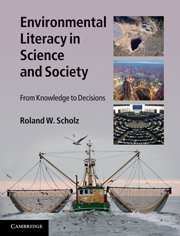Book contents
- Frontmatter
- Contents
- Boxes
- Acknowledgments
- International praise for Environmental Literacy in Science and Society
- Preamble
- Overview: roadmap to environmental literacy
- I Invention of the environment: origins, transdisciplinarity, and theory of science perspectives
- II History of mind of biological knowledge
- III Contributions of psychology
- IV Contributions of sociology
- V Contributions of economics
- 10 Origins of economic thinking and the environment
- 11 Contemporary economic theories dealing with the environment
- VI Contributions of industrial ecology
- VII Beyond disciplines and sciences
- VIII A framework for investigating human–environment systems (HES)
- IX Perspectives for environmental literacy
- Glossary
- References
- Index
11 - Contemporary economic theories dealing with the environment
from V - Contributions of economics
Published online by Cambridge University Press: 05 August 2012
- Frontmatter
- Contents
- Boxes
- Acknowledgments
- International praise for Environmental Literacy in Science and Society
- Preamble
- Overview: roadmap to environmental literacy
- I Invention of the environment: origins, transdisciplinarity, and theory of science perspectives
- II History of mind of biological knowledge
- III Contributions of psychology
- IV Contributions of sociology
- V Contributions of economics
- 10 Origins of economic thinking and the environment
- 11 Contemporary economic theories dealing with the environment
- VI Contributions of industrial ecology
- VII Beyond disciplines and sciences
- VIII A framework for investigating human–environment systems (HES)
- IX Perspectives for environmental literacy
- Glossary
- References
- Index
Summary
Chapter overview
We have discussed the different concepts of rationality that scientists assume underlie human behavior (see Box 1.4). These concepts, such as man as a fully rational being or man having bounded rationality, represent different world views. The same holds true for different beliefs on how human systems or human species cope with scarcity or with limited resources. This chapter thus starts with a historical landmark, i.e. some key ideas preceding ecological economics, which is characterized by a different world view to economic thought. We then introduce two pairs of concepts: public and private goods, and the efficiency and the welfare function of markets. These are essential for understanding contemporary economic thought on how actors deal with common natural resources. After this, we present resource economics, which provides basic ideas on scarcity and substitutability inherent in the conception of weak sustainability.
Besides resource economics and ecological economics, environmental economics is a third line of economics focusing on material–environmental systems. Environmental economics overlaps with resource economics but is often related to the biotic, green environment. In particular, environmental economics emerged from the economic valuation of pollution costs in a similar way as Pigou defined them (see Chapter 10.5).
We then trace how ecological economics emerged from environmental economics. We show and critically discuss how thermodynamic ideas affected ecological economics, which stresses geophysical constraints of human life and economic activity. The chapter finishes with institutional economics and new institutional economics. This interdisciplinary field takes a broader view on the market actors, their property rights, and the contracts and enforcements of formal and informal rules that govern economic transaction. We discuss this approach and the disciplinary economics and interdisciplinary ingredients and their contributions to environmental and resource economics.
- Type
- Chapter
- Information
- Environmental Literacy in Science and SocietyFrom Knowledge to Decisions, pp. 281 - 304Publisher: Cambridge University PressPrint publication year: 2011



